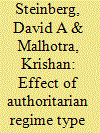| Srl | Item |
| 1 |
ID:
119646


|
|
|
|
|
| Publication |
2013.
|
| Summary/Abstract |
Why do countries open their economies to global capital markets? A number of recent articles have found that two types of factors encourage politicians to liberalize their capital accounts: strong macroeconomic fundamentals and political pressure from proponents of open capital markets. However, these conclusions need to be re-evaluated because the most commonly used measure of capital account openness, Chinn and Ito's (2002) Kaopen index, suffers from systematic measurement error. We modify the Chinn-Ito variable and replicate two studies (Brooks and Kurtz 2007; Chwieroth 2007) to demonstrate that our improved measure overturns some prior findings. Some political variables have stronger effects on capital account policy than previously recognized, while macroeconomic fundamentals are less important than previous research suggests.
|
|
|
|
|
|
|
|
|
|
|
|
|
|
|
|
| 2 |
ID:
161426


|
|
|
|
|
| Summary/Abstract |
This article examines public opinion toward sovereign debt disputes. Using evidence from multiple surveys fielded in Argentina—the country at the center of the most prominent legal dispute with foreign bondholders—we explore the sources of public support for debt repayment. Our evidence shows that economic self-interest and competing issue frames have little impact on attitudes toward debt repayment in Argentina. Individuals’ opinions toward debt disputes are driven primarily by their longstanding symbolic attitudes. In particular, partisan identity and presidential approval provide the strongest predictors of attitudes toward debt repayment. We also show that partisanship has particularly strong effects for well-informed voters and in periods marked by abundant information about elite positions on this issue. This supports elite-cueing theories of public opinion. These findings may help explain why some governments refuse to settle economically costly disputes with their external creditors.
|
|
|
|
|
|
|
|
|
|
|
|
|
|
|
|
| 3 |
ID:
132508


|
|
|
|
|
| Publication |
2014.
|
| Summary/Abstract |
Conventional wisdom holds that autocracies are more likely than democracies to adopt interventionist and protectionist economic policies, including fixed and undervalued exchange rates. This article suggests that this view is only partially correct: nondemocracies are a heterogeneous grouping, and only some types of authoritarian regimes adopt different foreign economic policies from those of their democratic counterparts. Using the example of exchange rate policy, the authors show that foreign economic policy varies across monarchic, military, and civilian dictatorships. More specifically, they hypothesize that monarchies and military regimes are more likely than democracies and civilian dictatorships to maintain fixed exchange rate regimes because the former regimes have smaller "selectorates" than the latter. The authors also expect that monarchies and civilian dictatorships maintain more undervalued exchange rates than democracies and military regimes because the former regimes provide their leaders with greater tenure security than the latter regimes. These hypotheses are evaluated using a time-series-cross-sectional data set of a large sample of developing countries from 1973 to 2006. The statistical results accord with these predictions. These findings indicate that the ways in which democracies engage with the global economy may be less unique than many believe.
|
|
|
|
|
|
|
|
|
|
|
|
|
|
|
|
| 4 |
ID:
082463


|
|
|
|
|
| Publication |
2008.
|
| Summary/Abstract |
Does government involvement in the economy promote ethnic peace, or does it contribute to ethnic violence? Two theories, grievances and opportunity, suggest that government involvement in the economy reduces ethnic violence. We present an alternative security-based logic that focuses on the role of economic rents in political competition. Our theory of insecurity predicts that free market economies reduce violent ethnic conflict by reducing fear and insecurity. We present statistical analyses, using data from the Minorities at Risk project and the Index of Economic Freedom, showing that government involvement in the economy increases ethnic rebellion. Our results suggest that the overall size of the public sector is less important than government interference with the market allocation mechanism. We conclude by discussing the policy implications of our findings
|
|
|
|
|
|
|
|
|
|
|
|
|
|
|
|
| 5 |
ID:
156256


|
|
|
|
|
| Summary/Abstract |
Will China’s currency, the renminbi (RMB), become a major international reserve currency that rivals the US dollar in the next decade? This article argues that this is unlikely for domestic political and economic reasons. China has some important systemic advantages that other recent challengers to the dollar have lacked, such as a large economy, a major role in the international trading system and substantial military capabilities. However, China’s domestic political system poses an important barrier to the internationalization of its currency. Chinese political institutions and financial policies reduce the attractiveness of the RMB as a reserve currency. Strong opposition to financial reform from Chinese interest groups has blocked reforms that would enhance the RMB’s attractiveness, and is likely to prevent substantial liberalizing reform in the future. Moreover, changes in China’s political economy during the Xi Jinping era (2012–present) have exacerbated these domestic deficiencies. Due to these various domestic political obstacles, the RMB is unlikely to emerge as a top reserve currency in the next ten years.
|
|
|
|
|
|
|
|
|
|
|
|
|
|
|
|